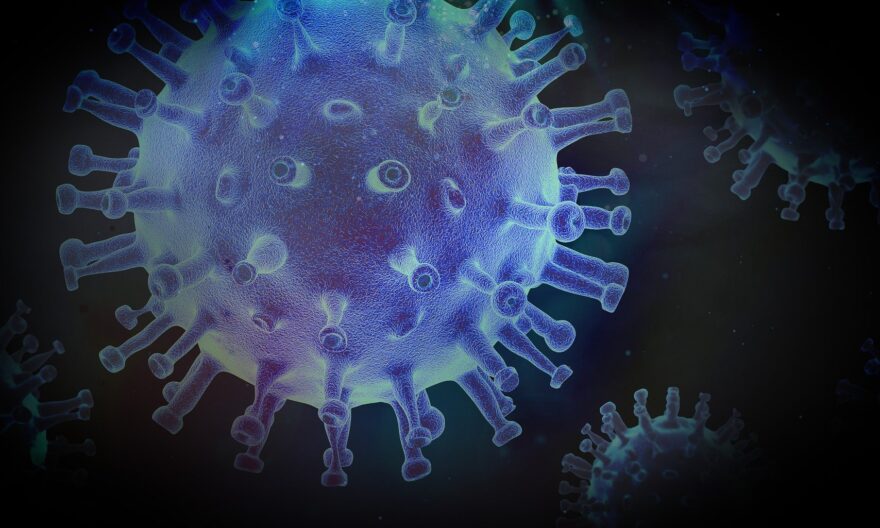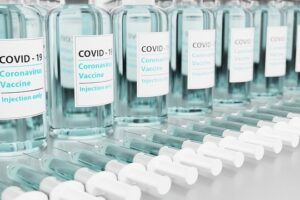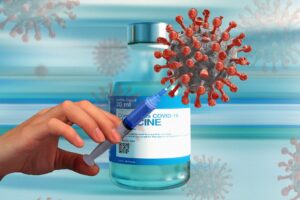
On Monday, Pfizer-BioNTech’s Comirnaty became the first Covid-19 vaccine to move past Emergency Use Authorization and gain full FDA approval in the United States. US politicians and public health authorities, including President Joe Biden, were quick to underline the importance of the decision and to encourage unvaccinated Americans to take the FDA’s seal of approval as a sign to go get their shot. Some will have little choice, as the medical regulator’s verdict paved the way for a slew of employer vaccine mandates.
Whether Americans roll up their sleeves fast enough to turn the corner on the fresh onslaught of cases sparked by the Delta variant is an open question. At present, a worrying 49% of Americans have yet to be fully vaccinated, despite ample supply of vaccines in the country. What’s more, vaccine coverage is widely uneven across the United States, with some areas approaching 90% of adults vaccinated while other counties have less than 30% vaccination coverage. Unsurprisingly, this patchwork of vaccination rates is reflected in the nation’s hospitals: hospital intake of Covid-19 patients is four times higher in states with lower vaccine coverage, while eight of the most vaccine-hesitant states comprise half of the country’s total Covid-19 hospitalizations.
American policymakers and public health experts are waking up to the realization that vaccination alone won’t be enough to lift the country out of the pandemic; a situation that’s hardly unique to the United States. As the spread of the more infectious and aggressive Delta variant is causing hospitalization rates to soar across the globe, hopes of herd immunity are fading and it’s increasingly clear that Covid-19 will eventually become endemic. As such, public health priorities will have to shift—from focusing on vaccines to ensuring that effective treatments are available to reduce the risk of severe illness in those who inevitably continue to contract Covid-19.
Vaccines are a powerful preventative measure, but not enough
Despite the effective vaccines on the market, patients continue to be admitted to hospital for Covid-19—and will continue to be for the foreseeable future. In the US, for example, while experts are hoping that the FDA’s formal approval of the Pfizer vaccine will cause an uptick in vaccination rates, vaccine hesitancy is determined by a variety of different factors, many of which will not be resolved by the medical regulator’s green light. In parallel, countless people around the world—from young children to the immunosuppressed—are unable to receive the vaccine due to their age or medical history. Many people, meanwhile, might be willing and able to take the vaccine, but live in countries without adequate vaccine supply, meaning that they might have to wait months or years for an inoculation.
What’s more, while the available vaccines are highly effective and can provide up to 96% protection from hospitalization even against the Delta variant, no vaccine is infallible, including the coronavirus vaccines currently on the market. Recent studies have indicated that, as expected, immunity from Covid-19 vaccines wanes over time, while new variants may pop up that make extant vaccines less effective.
As the global death count continues its depressing ascent, Covid-19 medicines are therefore crucial to shore up the international medical response. The FDA has currently issued official approval for just one Covid-19 treatment named Veklury (or remdesivir) and Emergency Use Authorizations for a handful of anti-inflammatory treatments, corticosteroids and anti-SARS-CoV-2 antibody drugs. Several potential treatments, however, are demonstrating positive results in clinical trials and could soon bolster this small arsenal of coronavirus therapies—an encouraging sign for the medical professionals preparing to treat Covid-19 as an endemic disease.
Covid-19 therapies from Rigel and Humanigen stepping into the breach
A number of pharmaceutical companies are developing highly promising coronavirus treatments to reduce the risk of severe disease in Covid-19 patients. California-based biotechnology firm Rigel Pharmaceuticals, for one, has seen success repurposing its oral medicine TAVALISSE (or fostamatinib) for coronavirus patients. Tavalisse is already approved for medical use for chronic immune thrombocytopenia—but it now appears that it can also calm overly reactive immune responses in Covid-19 patients requiring supplemental oxygen. After results from a Phase 2 trial of 59 patients on oxygen demonstrated that fostamatinib halved the chances of serious adverse events and reduced deaths, Rigel is now carrying out a Phase 3 trial on 308 hospitalized patients supported by a grant from the US Department of Defense, while the drug has also been included in a separate Phase 3 trial by the National Heart, Lung, and Blood Institute.
Another strong candidate for emergency authorization by the FDA is Humanigen’s GM-CSF inhibitor named lenzilumab. Phase 3 trials of the drug show a 54% improvement in a patient’s likelihood of survival without ventilation over the placebo treatment. Scientists have also found that the treatment is particularly effective in Black and African-American patients, who demonstrated a nine-fold improvement in their chances of survival. This particularity is important as these patients are statistically less likely to be fully vaccinated and are at a higher risk of death following a Covid-19 infection.
While nearly 5 billion vaccine doses have been delivered so far around the world, billions of people—whether by choice or by circumstance—remain unvaccinated and therefore extremely vulnerable to severe disease caused by Covid-19. With new variants complicating the equation and pushing any prospect of mass immunity well into the future, the myriad medical reinforcements in the pipeline offer a light at the end of the tunnel.



